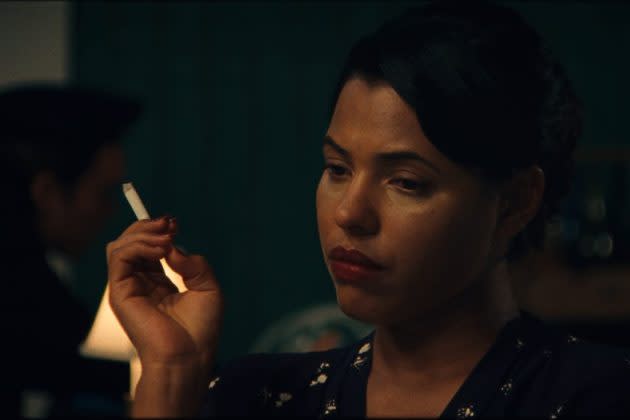‘The Ballad of Suzanne Césaire’ Review: An Intoxicating Reverie Reclaims an Elusive Legacy
- Oops!Something went wrong.Please try again later.
- Oops!Something went wrong.Please try again later.

It is both much too big and way too small to describe Madeleine Hunt-Ehrlich’s gorgeously allusive “The Ballad of Suzanne Césaire” as a biopic. The impulse behind the film — to re-write this remarkable woman back into the French and Caribbean cultural histories that have long neglected her in favor of her famous politician husband, Aimé Césaire — is standard-issue biopic fuel. But Hunt-Ehrlich complicates and prevaricates on that impulse in increasingly provocative and hypnotic ways, delivering a woozily metatextual essay that lives inside the mystery of Césaire’s tiny but influential corpus of work, rather than trying to solve it.
“Here we are, making a film about an artist who didn’t want to be remembered,” says Zita Hanrot, boldly breaking the fourth wall. She plays Suzanne — a beautiful woman in red lipstick, smoking and swaying to swing records playing on the gramophone — but she also plays a riff on herself, an actress with one eye on her newborn baby who’s being pushed about in a stroller between takes. She reads fragments of Suzanne’s work and letters, onscreen and in voiceover, in both personas, and like all the other onscreen participants, she is so deeply submerged in the strangeness of the project that it doesn’t feel strange at all.
More from Variety
Césaire was born on Martinique and studied in Paris where she married Aimé and met André Breton, one of the founding Surrealists. Back in the Antilles during WWII, bridling against the repressive collaborationist Vichy government, she and Aimé hoodwinked the authorities into letting them put out a journal for which Suzanne wrote seven articles; they now comprise the totality of her published work. That’s not to say she didn’t write anymore. She was a teacher, a political activist and organizer and a mother of six children, but she never stopped writing. She just tore up and disposed of everything she wrote after 1945, bar her letters, some of which — those to Breton especially — survive. Hence the odd ambivalence of “Ballad,” which somehow summons a lot of this backstory without ever explicitly outlining it. If Césaire really did not want to be remembered, should we memorialize her? And if the charged lyricism of her writing (“To hell with hibiscus, frangipani, bougainvillea,” Césaire wrote, “Martinque poetry will be cannibal or it will not be”) still has the power to reach through the intervening decades and inspire modern minds, how can we not?
Hunt-Ehrlich reconciles these contradictions by layering the making of her film — in which even the clapper loader seems to have fallen under Césaire’s spell — over snatches from her essays and letters, which in turn melt into evocatively recreated scenes of a trip Breton (Josué Gutierrez) made to Martinique to visit Suzanne and Aimé (Motell Foster) during the war. There’s even some archival footage, of a storm ripping through palm trees: to bear witness to such natural destruction is, in Césaire’s words to participate “in the island’s absence of equilibrium.”
If it all sounds impossibly complex “Ballad” is assembled with such peculiar, calm exactness that it actually resembles a series of experiments in simplicity. Most of Alex Ashe’s beautifully composed 16mm images are uncluttered close-ups of face or body or forest. But they are assembled with such care that they feel as dense as the dripping Martinique foliage, pregnant with meaning and possibility. The soundtrack, too, is an exemplary collaboration between Andrew Tracy’s sound design and Sabine McCalla’s music — from the subtle crackle of an old-timey recording giving way to the shifting beat of drummers gathered in the shade, to the drowsy insect buzz of the humid Antillean air being replaced by female voices harmonising a traditional Creole folksong — one that, incidentally, invokes the Haitian goddess of revolution and mistreated women.
Even from the partial glimpses we get here, it’s evident that Césaire was a singularly gifted writer who crucially never divorced her literary instincts from her political ideology. “Proust wrote in his parents’ luxurious house,” she observed drily, “Very sincerely, make Proust a farm worker from Martinique, I doubt he would have written “In Search of Lost Time”.” Perhaps her understanding of the tipped scales of economic and social justice was partly behind her decision to destroy her subsequent writings, as a tiny act of pre-emptive rebellion, a way to reject the colonial, patriarchal structures that govern how we think about the past before they could reject her, which they inevitably did. Hunt-Ehlich’s lovely, questing, curious art film cannot singlehandledly redress Césaire’s omission from the annals. But it does suggest that if posterity has forgotten her, it’s only with its conscious mind, where “The Ballad of Suzanne Césaire” is piped in from the collective unconscious. Perhaps, when history sleeps on those who shaped it, this is what it dreams.
Best of Variety
Sign up for Variety’s Newsletter. For the latest news, follow us on Facebook, Twitter, and Instagram.
